卓越补习八年级下册英语广州牛津版课文笔记U1讲课讲稿
牛津版八年级英语下 Unit 1教案

牛津版八年级英语下 Unit 1教案Unit 1 The 1st periodContent: Grammar(一)Teaching aims:1. To learn some new words.2. To learn the use of the present perfect tense.3.To understand the difference between the present perfect tense and the simple pasttense.Important and difficult points:The use if the perfect tense: have/ has +p.p.Teaching Procedures:Step1.Teach the new words from P8 to P12.Step 2.Lead in the present perfect tense.T: When did you have breakfast?S:I had breaskfast an hour ago.T: He had breakfast an hour ago. He has had breakfast.(Bb)T: Where did you study English last term?S: We studied English in Shanxi No.2 Middle School.T: Yes. You studied English in Shanxi No.2 Middle School. You have studied here for about two years.(Bb)→我们用一般过去时谈论过去发生的动作,但当过去发生的动作和现在有联系有影响时,我们用现在完成时态.(Refer to P9)→Structure: have/has+V(过分)Step 3.How we form the past participles of verbs P10 (Add the simple past forms)Add: have---had---had hear---heard---heard buy---bought---bought go---went---gone do---did----done eat---ate---eaten forget---forgot---forgotten cut---cut---cut read---read---readStep 4.Explain the use of the present perfect tense.(一)基本用法:1. 到现在为止这段时间已发生的情况.动作从过去延续到现在.eg. She has been ill for three days. (She’s been…)We have learned 2,000 English words. (We’ve …)2. 某个动作虽是过去发生,但其后果和影响及于现在.eg. Thanks you.I’ve had my supper.(现在用不着吃) Tom has seen the film.(对这部电影有所了解)(二)时间状语:already,yet(否,疑),since,ever,never,just,before(句尾),for+时间段,recentlyeg.She has already finished her work.I have ever heard about it.Step 5.Change the above sentence patterns to general questions, negative sentences and question the underlined parts.Step 6.Make sentences P10 A1Step 7. Compare the difference between the present perfect tense and the simple past tense.现在完成时的特点是某一动作发生与现在有联系,一般过去时则单纯谈过去发生的某一动作,不涉及对现在的影响.eg.Simon has lost his watch./Simon lost his watch.Have you bought a pen?/When did you buy the pen? What did you have for lunch?/Have you had lunch?etc注:句中有表示过去的时间状语如yesterday,last week,…ago etc,不能用现完. Step 8.Chat time P11,A2Step 9.AssignmentUnit 1 The 2nd periodContent: Grammar(三)T eaching aims:1. To learn some new words.2. To learn the use of the present perfect tense.3.To understand the difference between “since”and “for”Important and difficult points:The differences: have been to & have gone toSince & for…Teaching Procedures:Step1.Dictate the new words from P8 to P12Step2.Teach the new words from P1 to P7.Step3.Check the homework.Step4.Review the present perfect tense.→Structure: have/has+V(过去分词)Past participle: 规则动词的过去分词与过去式相同。
广州牛津八下Unit1
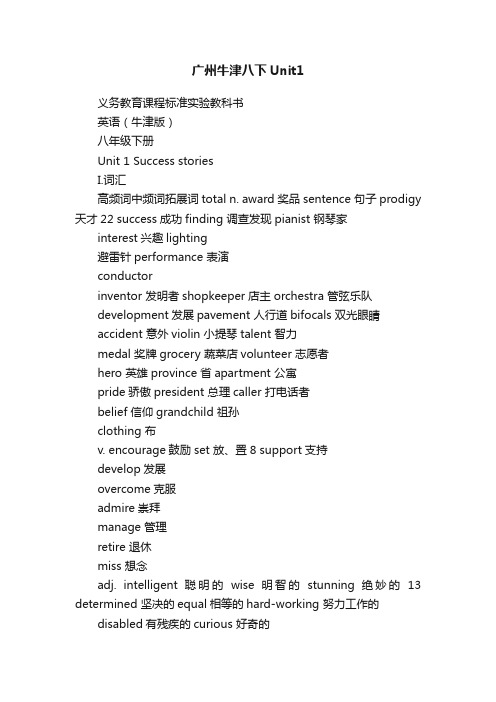
广州牛津八下Unit1义务教育课程标准实验教科书英语(牛津版)八年级下册Unit 1 Success storiesI.词汇高频词中频词拓展词total n. award 奖品sentence 句子prodigy 天才22 success成功finding 调查发现pianist 钢琴家interest兴趣lighting避雷针performance 表演conductorinventor 发明者shopkeeper 店主orchestra 管弦乐队development发展pavement 人行道bifocals 双光眼睛accident 意外violin 小提琴talent 智力medal 奖牌grocery 蔬菜店volunteer 志愿者hero 英雄province 省apartment 公寓pride骄傲president 总理caller 打电话者belief 信仰grandchild 祖孙clothing 布v. encourage鼓励set 放、置8 support支持develop发展overcome克服admire崇拜manage 管理retire 退休miss 想念adj. intelligent 聪明的wise 明智的stunning 绝妙的13 determined 坚决的equal相等的hard-working 努力工作的disabled有残疾的curious 好奇的strict严厉地national 国家的talented天才的adv. forever永远地 2 actually 事实上地nowadays 现今prep. including 包括 1 pron. anyone 任何人 1 total 32 8 15 45 II.详解1. success n. 成功原文再现However, Lang Lang’s success came at a price. (P2)然而朗朗的成功是付出了代价的。
牛津版八年级英语下Unit1复习教案
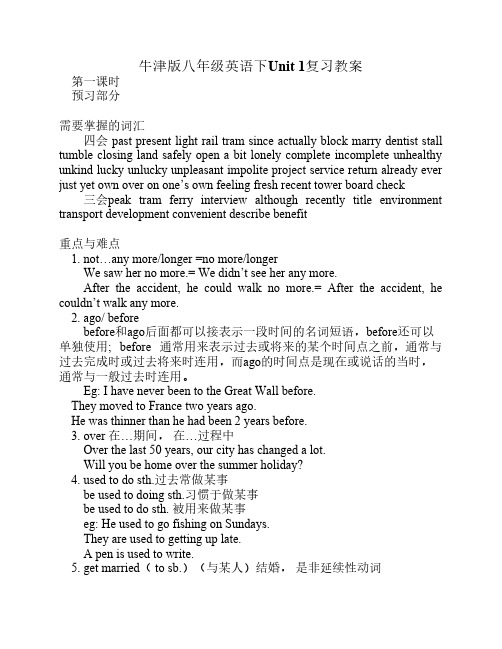
牛津版八年级英语下Unit 1复习教案第一课时预习部分需要掌握的词汇四会 past present light rail tram since actually block marry dentist stall tumble closing land safely open a bit lonely complete incomplete unhealthy unkind lucky unlucky unpleasant impolite project service return already ever just yet own over on one’s own feeling fresh recent tower board check 三会peak tram ferry interview although recently title environment transport development convenient describe benefit重点与难点1. not…any more/longer =no more/longerWe saw her no more.= We didn’t see her any more.After the accident, he could walk no more.= After the accident, he couldn’t walk any more.2. ago/ beforebefore和ago后面都可以接表示一段时间的名词短语,before还可以单独使用; before 通常用来表示过去或将来的某个时间点之前,通常与过去完成时或过去将来时连用,而ago的时间点是现在或说话的当时,通常与一般过去时连用。
Eg: I have never been to the Great Wall before.They moved to France two years ago.He was thinner than he had been 2 years before.3. over 在…期间,在…过程中Over the last 50 years, our city has changed a lot.Will you be home over the summer holiday?4. used to do sth.过去常做某事be used to doing sth.习惯于做某事be used to do sth. 被用来做某事eg: He used to go fishing on Sundays.They are used to getting up late.A pen is used to write.5. get married( to sb.)(与某人)结婚,是非延续性动词My parents got married in 1989.be married (to sb.)Are you married?My parents have been married for 16 years.marry v.He is going to marry a girl from his hometown.Her mother wants to marry her to a rich man.6. pleasant/ pleasedpleasant 令人愉快的,常形容事物;pleased 感到高兴的,常用来形容人。
【最新】牛津译林版八年级英语下册Unit1 Grammar公开课课件.ppt

since: 肯定句/否定句/疑问句,表示“自---以 后”
yet: 疑问句/否定句,表示“已经”或者“还 没有”
Exercises
1. I h__a_v_e_h_a_d_(have) lunch already. 2. Has the train_a_r_r_iv_e_d_ (arrive), yet? 3.Tome _h_a_s_ never_b_e_e_n__to_ (be to ) China. 4. The twin __h_a_s__just _s_e_e_n_(see) my
an action that started in the past and continues to the present.表示过去开始,现在还在继续的 动作。
We use the present perfect tense to talk about an action that happened in the past and has a connection with the present.
Subject (主语)
have / has + (not)
(助动词)
past participle (过去分词)
I/You/We/They He/She/It
have (not) has (not)
moved. moved.
一般疑问句
Have/ Has + 主语 + 动词的过去分
Ha词ve
I/you/we/they
(学习动词的过去分词变化规则。)
3. Learn some time expressions usually used in PPT.
(学习常用在现在完成时里的时间表达方式。)
牛津版英语八下_Module 1 课文知识点标注
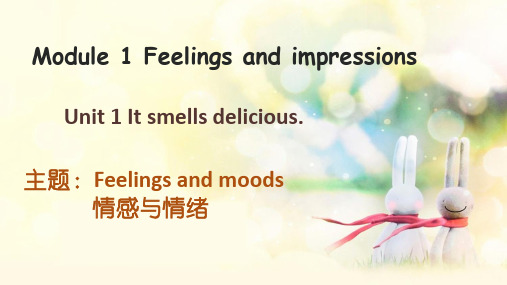
Tony: What's this? It tastes sweet too.
爱吃甜食
Betty: That's strawberry jam, for the cake.
Daming: Good, everything tastes so sweet! It's my lucky day!
Unit 2 | feel nervous when I speak Chinese.
too strong and it tastes a bit sour. 4. They taste really sweet and they feel soft in the middle. 5. Apple pie sounds nice. 6. It tastes sweet. It's sugar. 7. Everything tastes so sweet!
Hi Lingling, 因……而感谢 Thanks for your last message. It was great to hear from you, and I can't wait to meet you. 从 I hope you will know me from my photo when I arrive at the airport. I'm quite tall, with short fair hair, and I wear glasses. I'll wear jeans and a T-shirt for the journey, but I'll also carry my warm coat. I've got your photo一you look very pretty. I'm sure we'll find each other!
牛津译林版八年级英语下册Unit1知识点归纳总结
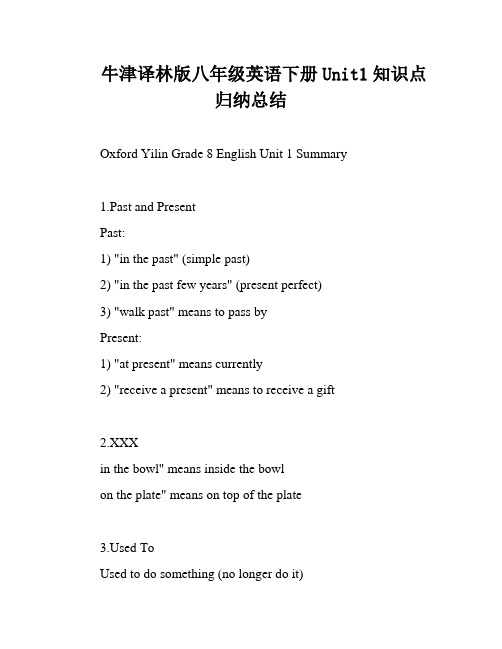
牛津译林版八年级英语下册Unit1知识点归纳总结Oxford Yilin Grade 8 English Unit 1 Summary1.Past and PresentPast:1) "in the past" (simple past)2) "in the past few years" (present perfect)3) "walk past" means to pass byPresent:1) "at present" means currently2) "receive a present" means to receive a gift2.XXXin the bowl" means inside the bowlon the plate" means on top of the plateed ToUsed to do something (no longer do it)Used to be (was/were in the past)Share something with someonee.g。
"You often shared food with me in the past" -。
"You used to share food with me"Be/get used to doing something (still do it)e.g。
"I am used to waking up at 6 a.m."4.JustJust" can mean "a moment ago" (present perfect)Just" can also mean "exactly" (emphasizing)Just now" means "a moment ago" (simple past)5.ChangeChange" can be a verb or a nounXXX。
2019年牛津深圳广州版八年级下册英语 Unit1词汇课文教学案

Unit1 知识及综合训练Ⅰ.单元基础拼读必过1.根据音标熟读单词raise permission disabled teenager offer suffer serious illness organize express pain lonely friendship difficulty joy peace hurt courage spirits pay community2.Unit1短语in needask permissiongive sb. a handraise moneysuffer fromused sth. for doing sth continuve to do sth have difficulty doing sth. raise one's spiritsbe in high spiritsin good/bad health in order toaged from…to…be unable/able to do attend schoolthe very firstoffer to dowork asmillions ofgive sb. pemission to do pay for sbwish to doⅡ.重点解析:1.根据前缀猜测词义Vivien’s parents died in a car accident, and she is unhappy and very lonely.Annie wanted to help disabled children.un-, dis- 为否定前缀●dis-主要加在名词、形容词,动词之前,dis-为否定前缀的词有:disadvantage缺点、dishonorable不光彩的、disagree不同意、disappear消失、disarm解除武装、disconnect失去联系●un-主要放于名词,形容词,副词前面,常见的例子有unfinished未完成的、undoubted无疑的、unemployment 失业。
(完整版)卓越补习八年级下册英语广州牛津版课文笔记U2
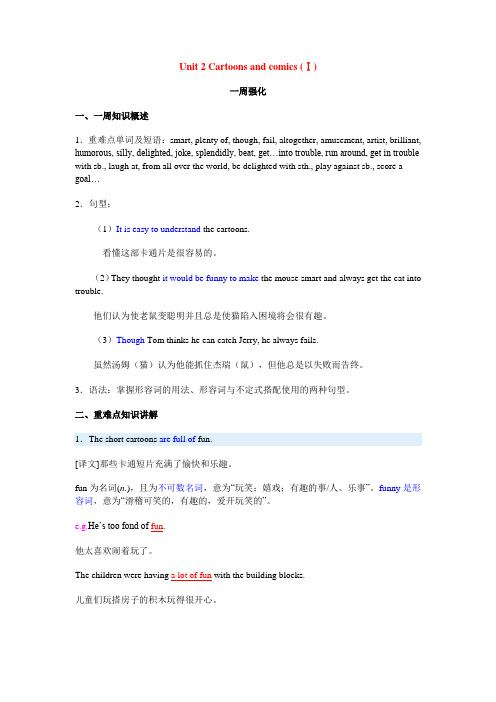
Unit 2 Cartoons and comics (Ⅰ)一周强化一、一周知识概述1.重难点单词及短语:smart, plenty of, though, fail, altogether, amusement, artist, brilliant, humorous, silly, delighted, joke, splendidly, beat, get…into trouble, run around, get in trouble with sb., laugh at, from all over the world, be delighted with sth., play against sb., score a goal…2.句型:(1)It is easy to understand the cartoons.看懂这部卡通片是很容易的。
(2)They thought it would be funny to make the mouse smart and always get the cat into trouble.他们认为使老鼠变聪明并且总是使猫陷入困境将会很有趣。
(3)Though Tom thinks he can catch Jerry, he always fails.虽然汤姆(猫)认为他能抓住杰瑞(鼠),但他总是以失败而告终。
3.语法:掌握形容词的用法、形容词与不定式搭配使用的两种句型。
二、重难点知识讲解1.The short cartoons are full of fun.[译文]那些卡通短片充满了愉快和乐趣。
fun为名词(n.),且为不可数名词,意为“玩笑;嬉戏;有趣的事/人、乐事”。
funny是形容词,意为“滑稽可笑的,有趣的,爱开玩笑的”。
e.g.He’s too fond of fun.他太喜欢闹着玩了。
The children were having a lot of fun with the building blocks.儿童们玩搭房子的积木玩得很开心。
牛津译林版八年级英语下册Unit1 grammar I教学课件

1. He _h_a_s_n_’_t_f_i_n_is_h_e_d_ (not finish) the homework yet. He will try to finish it quickly.
2. My family _h_a_s_l_iv_e_d_ (live) in Nanjing since 1996.
Sandy: Did you enjoy the exhibition? Millie: Yes, I did. I (9)__le_a_r_n_t_ (learn)
a lot about Beijing’s past and present. It’s a good exhibition and I (10)_h_a_v_e_d_e_c_i_d_e_d_ (decide) to see it again. Do you want to go with me? Sandy: Sure. I won’t miss it this time.
e.g. I have not seen Harry Potter yet.
He hasn’t been to Tianjin since then.
3. 现在完成时的一般疑问句 句型 Have/Has + 主语 + 过去分词
Have you…?
Has he…?
Yes, I have.
Yes, he has.
_现__在__完__成__时___ 则常与just, already, ever, never等副词和these days, this week, since ..., for ...等表示一段时间的时间状 语连用。
3. ① He went to Guilin in 1998. 他在1998年去过桂林。 (这句话只说明他在过去某个时间去 过桂林。)
(完整版)卓越补习八年级下册英语广州牛津版课文笔记U1

Unit1Success stories (Ⅰ)一周强化一、一周知识概述1.重难点单词与短语:award,success,strict encourage,support,interest,develop,development,overcome,admire,accident,pride,on television,at the age of,at a price,be strict with sb,fall ill,in place of,be grateful to sb for sth,…2.句型①He was watching a Tom and Jerry cartoon on television when he first heard western classical music.当他首次听到西方古典音乐时,他正看Tom and Jerry卡通电视。
②LangLang began taking(begin doing sth)piano lessons at the age of three.LangLang在他三岁时开始上钢琴课。
③I think he is successful.我认为他是成功的。
④I admire her because(原因状语从句) she plays the violin for love, not just to win competitions.我钦佩她,她是出于热爱而拉小提琴,而不仅为赢得比赛。
3.语法:过去进行时。
二、单元重难点知识讲解[译文]Ben负责为校报写关于成功人士经历的稿子。
be responsible for sth意为“负责某事”。
e.g.The pilot of the plane is responsible for the passengers’ safety.飞机驾驶员应对旅客的安全负责。
如果主语不是人,则表示造成事实的“原因”。
最新牛津译林版英语八年级下册unit1 weclome to the unit重难点讲解课件

by+交通工具名词,在句中作状语.
eg:My teacher likes to travel by plane. in/on+限定词+交通工具名词 ,在句中作状语. eg:He often goes to school in his father’s car every day. 如:take a bike/taxi by ship/car/taxi/boat/plane
中考链接 1.My life
Байду номын сангаас
a lot in the past few years. A. change B.has changed C.have change D.changing 2.-It’s the second time I came to Xiamen.It -Yes,it’s more and more beautiful. A. change B.has changed C.have change D.changing
知识探究4 Chang的用法
Chang的用法:作动词讲,“改变,交换,换乘” eg:The weather changes very often in England. eg:Can I change seats with you? eg:He changed his mind at last. 作名词讲,“变化,转变”.作不可数名词讲时,意为“零钱”. eg:Great changes have taken place in this city since 1984. eg:I have no change with me. change into变成 eg:The loud noise changed into a low hum.(嗡嗡声)
广州牛津版八年级英语下册第一二单元课文知识要点
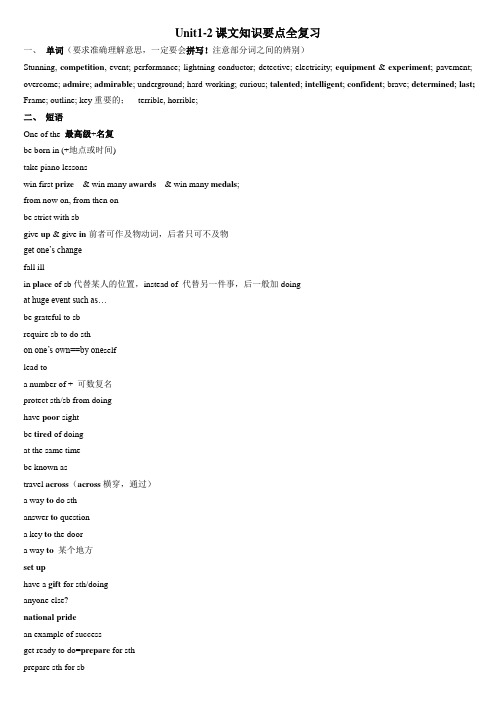
Unit1-2课文知识要点全复习一、单词(要求准确理解意思,一定要会拼写!注意部分词之间的辨别)Stunning, competition, event; performance; lightning conductor; detective; electricity; equipment & experiment; pavement; overcome; admire; admirable; underground; hard-working; curious; talented; intelligent; confident; brave; determined; last; Frame; outline; key重要的;terrible, horrible;二、短语One of the 最高级+名复be born in (+地点或时间)take piano lessonswin first prize& win many awards& win many medals;from now on, from then onbe strict with sbgive up & give in前者可作及物动词,后者只可不及物get one’s changefall illin place of sb代替某人的位置,instead of 代替另一件事,后一般加doingat huge event such as…be grateful to sbrequire sb to do sthon one’s own==by one selflead toa number of + 可数复名protect sth/sb from doinghave poor sightbe tired of doingat the same timebe known astravel across(across横穿,通过)a way to do sthanswer to questiona key to the doora way to某个地方set uphave a gift for sth/doinganyone else?national pridean example of successget ready to do=prepare for sthprepare sth for sbI can manage.save uplook for & find前者强调动作和过程,后者强调结果fight for为谁/什么而战& fight against与什么作战,反对be equal toin total=altogether=in all总共retire from从哪里退休fire火,解雇be regarded as被认为…be curious about sthTwo of the 最高级+名复be full of==be filled within the late 1930sa huge success=a great successmost of 名复plenty of+可复或不可(lots of和a lot of也可或不可)a number of+可复since自从,因为fail失败,fail to do 未能做altogether=all together=in all=in totalalmost几乎,almost not=hardly几乎不from all over the world=in the whole world; think of想起think over仔细考虑think about考虑make sure确定show/see/watch/hear/listen to+sb do/doingbe delighted/pleased/happy with sthscore a goalplay a trick on sbdate back to追溯到in really good condition状况非常好in existence存在whenever=no matter when无论何时however=no matter how无论如何whatever=no matter what无论什么knock sb down撞到in reply回答,答复三、句子1 Would you rathe r be rich or famous? I’d rather be both.2 Lang Lang’s story is much more interesting than this simple sentence.3 His success came at a price.4 His performance was a great success and his life was changed forever.5 He says he is grateful to his parents since they have always encouraged and supported him.6 强调句He did invent the lightning conductor. 动词前加助动词,动词还原成原型。
牛津译林版八年级英语下册Unit1 Grammar公开课课件

center into a new park.
Pre –task:Learn on their own and answer When do we use present perfect tense?
We use the present perfect tense to talk about
father. 5. The twins s_a_w__(see) my father just now.
1 Have you done your homework ___y_et_ ? ( for, just, yet)
2 I have __n_e_v_e_r been to Chengdu. ( for, never, yet) 3 He has worked there s_i_n_c_e_ he left school. (already
Most verbs
Verbs ending in e Verbs ending in a consonant + y
+ ed +d - y + ied
wash→ washed
live→ lived
study→ studied
Short verbs ending in a double the stop→ vowel + a consonant consonant + ed stopped
Town?He has lived there since he was born. 2. What has the government done to part of the
town center?
广州牛津初二(下)unit1学生版
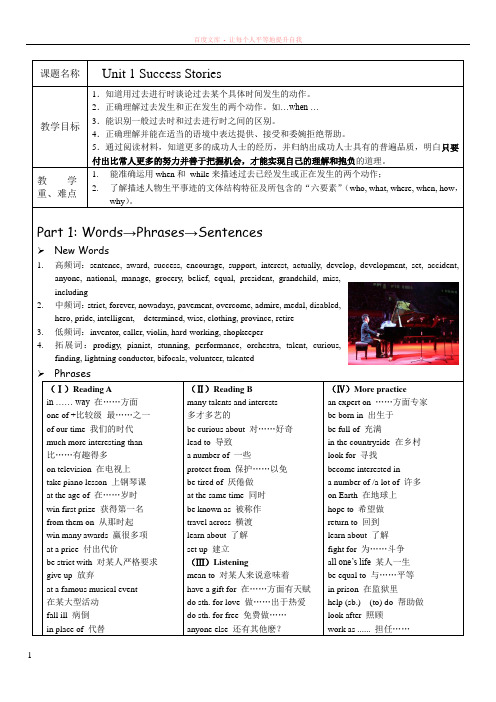
课题名称Unit 1 Success Stories教学目标1.知道用过去进行时谈论过去某个具体时间发生的动作。
2.正确理解过去发生和正在发生的两个动作。
如…when …3.能识别一般过去时和过去进行时之间的区别。
4.正确理解并能在适当的语境中表达提供、接受和委婉拒绝帮助。
5.通过阅读材料,知道更多的成功人士的经历,并归纳出成功人士具有的普遍品质,明白只要付出比常人更多的努力并善于把握机会,才能实现自己的理解和抱负的道理。
教学重、难点1.能准确运用when和while来描述过去已经发生或正在发生的两个动作;2.了解描述人物生平事迹的文体结构特征及所包含的“六要素”(who, what, where, when, how,why)。
Part 1: Words→Phrases→Sentences➢New Words1.高频词:sentence, award, success, encourage, support, interest, actually, develop, development, set, accident,anyone, national, manage, grocery, belief, equal, president, grandchild, miss,including2.中频词:strict, forever, nowadays, pavement, overcome, admire, medal, disabled,hero, pride, intelligent, determined, wise, clothing, province, retire3.低频词:inventor, caller, violin, hard-working, shopkeeper4.拓展词:prodigy, pianist, stunning, performance, orchestra, talent, curious,finding, lightning conductor, bifocals, volunteer, talented➢Phrases(Ⅰ)Reading Ai n …… way 在……方面one of +比较级最……之一of our time 我们的时代much more interesting than 比……有趣得多on television 在电视上take piano lesson 上钢琴课at the age of 在……岁时win first prize 获得第一名from them on 从那时起win many awards 赢很多项at a price 付出代价be strict with 对某人严格要求give up 放弃at a famous musical event在某大型活动fall ill 病倒in place of 代替(Ⅱ)Reading Bmany talents and interests多才多艺的be curious about 对……好奇lead to 导致a number of 一些protect from 保护……以免be tired of 厌倦做at the same time 同时be known as 被称作travel across 横渡learn about 了解set up 建立(Ⅲ)Listeningmean to 对某人来说意味着have a gift for 在……方面有天赋do sth. for love 做……出于热爱do sth. for free 免费做……anyone else 还有其他麽?(Ⅳ)More practicean expert on ……方面专家be born in 出生于be full of 充满in the countryside 在乡村look for 寻找become interested ina number of /a lot of 许多on Earth 在地球上hope to 希望做return to 回到learn about 了解fight for 为……斗争a ll one’s life 某人一生be equal to 与……平等in prison 在监狱里help (sb.) (to) do 帮助做look after 照顾work as ...... 担任……a great success 大成功give performances 表演be grateful to 对……感激work hard for 为……努力工作an example of ……的例子forget about 把……忘记spend time/money on sth.spend time/money in doing sth.in the world 在世界上2 metres tall 两米高at university 上大学时期stay with 呆在in total 总计retire from 从……退休be regard as 被看作✧即学即练:1. 他在四岁时就会弹钢琴了。
牛津译林版八年级英语下册Unit1单元知识点讲解(3)

牛津译林版8BU1 Past and present 知识点讲解 Teachingobjectives1.知识目标:掌握第一单元的单词和短语2.技能目标:能够理解篇章,解决篇章问题3.情感目标:学生能够学会用语言描述过去发生的事件 Key points,Difficult points 1.重点单词用法 2.篇章阅读技巧ic strip考点1 You've changed , Eddie.埃迪,你变了。
【知识讲解】change 此处用作不及物动词,意为“变化”。
此外,changes 还可以作及物动词词组:change A into B 意为“把A 变成B”。
_______________________ turn A into B1.In England, the weather changes very often.在英格兰,天气时常变化。
2.The government changed the place into a beautiful park last year.去年政府将这个地方变成了一个漂亮的公园。
3.Now the government has turned part of the town centre into a new park.现在政府已把城镇中心的部分改建成了一个新公园。
(教材第8页)4.The farmers are trying to turn wastelands into rice fields.农民们正努力把荒地变为稻田。
【例题详解】 1.(2023下·江苏常州·八年级校考阶段练习)The country life he was used to (change) greatly since 1992.2.(2023下·江苏泰州·八年级统考阶段练习)With the development of China, the life we were used to (change) greatly in the recent years.3.(2023下·江苏泰州·八年级统考阶段练习)There (be) great changes to this place over the past 10 years.4.(2016上·江苏扬州·八年级统考期中)I’m looking forward to __________(share) my joy with you.5.(2018下·八年级单元测试)Well, that’s another way I could think of ________ (share) the same idea with them.考点2. You used to share food with me!你过去常常与我分着吃食物的!【知识讲解】(1)used to 意为“曾经,过去常常”,暗含“现在不再”之意,后接动词原形。
- 1、下载文档前请自行甄别文档内容的完整性,平台不提供额外的编辑、内容补充、找答案等附加服务。
- 2、"仅部分预览"的文档,不可在线预览部分如存在完整性等问题,可反馈申请退款(可完整预览的文档不适用该条件!)。
- 3、如文档侵犯您的权益,请联系客服反馈,我们会尽快为您处理(人工客服工作时间:9:00-18:30)。
卓越补习八年级下册英语广州牛津版课文笔记U1Unit 1 Success stories (II)一周强化一、一周知识概述1.重难点单词及短语:determined, wise, hard-working, including, miss, retire, hero, disabled, belief, national, pride, manage, intelligent, equal, refuse, for love, forget about sb, come on, save up, fight for, be equal to, in total。
2.句型①—Can I help you with anything?我能帮你什么吗?—Thanks very much, but I can manage.非常感谢,但我自己能行。
②—Let me give you a hand.让我帮你吧!—That would be good.那太好了。
③—Come on. Let me give you a hand.—If you want, I could do some typing.—得了吧,让我帮你吧!—如果你愿意,我可以打打字。
3.语言功能:学会表达提出、接受和拒绝帮助。
二、重难点知识讲解1.What does success mean to you?[译文]对你而言,成功意味着什么?mean to sb.表示“对某人来说……意味着……”,mean为动词。
e.g. Knowledge means wealth to us.知识对我们来说意味着财富。
另外,mean还有一些其它的含义。
如下:(1)意思是。
e.g.The red light means“stop”.红灯表示停。
This signal means your message has been received. 这个信号表示你发送的信息已经收到了。
(2)有……的征兆。
e.g.The dark clouds mean rain.这些乌云是下雨的征兆。
(3)mean to do sth = plan to do sth 打算,意欲e.g.I mean to go tomorrow.我打算明天去。
I didn’t mean to start an argument.我并不想(跟你)争论。
(4)mean doing sth意味着。
e.g.Accepting the job means living abroad.接受这个工作就意味着在国外居住。
(5)meaning n.意义,涵义。
e.g.What’s the meaning of the words?=What do the words mean?这些词是什么意思。
2.He had a gift for running and kept practising every day.[译文]他具有跑步的天赋且每天坚持训练。
have a gift for sth/doing sth是一个词组,意为“具有……的天赋”。
e.g.Dee has a gift for making everyone feel at ease.迪有一种能让大家放松的天赋。
keep (on) doing保持/坚持干……e.g.Keep the fire burning.不要让火熄灭。
另外keep还有下列用法:(1)keep + adj.e.g.Don’t put it in the sun and keep it colourful.不要把它放在太阳底下,让它保持鲜艳。
(2)keep…from…阻止……做……e.g.Keep the earth from running away.阻止泥土流失。
3.She plays the violin for love…[译文]她是出于热爱而拉小提琴。
play the violin意为“拉小提琴”。
注意:在一些西洋乐器名词前要加定冠词the。
e.g. play the piano弹钢琴play the trumpet吹小号但短语play chess意为“下象棋”,chess前面不加定冠词,类似的还有:play card 打牌play basketball/football/table tennis 打篮球/踢足球/打乒乓球for love意为“出于热爱”。
e.g.He goes in for the job for love not to make money.他出于热爱从事这项工作而不为赚钱。
4.Joyce is very busy working on the school newspaper.[译文]乔伊斯在学校报社忙于工作。
be busy (in) doing sth忙于干……be busy with sth忙于某事work on忙于,从事……e.g.They are busy with their lessons.他们正在忙于学习功课。
He works on market research.他从事于市场研究。
The family are busy (in) getting ready for their journey.这家人正忙于准备旅行。
5.…, let me give you a hand.[译文]……,让我帮你一下吧!let sb. do sth.中let是一个使役动词,后面跟省去to的不定式,即动词原形。
e.g.Let’s go for a walk.让我们出去散步吧!类似的动词常用的有十一个半,为了方便记忆,可以编成如下顺口溜:一感(feel),二听(listen to, hear),三让(let, make, have),四看(look at, see, watch, notice),半帮助(help)。
这些词除help外,在主动语态中后面省去to的不定式,变成被动语态时,省去的to要再加上。
help在主动语态中后面的to可带可不带,变成被动语态的必须带上to。
e.g.We should help our parents do some housework.我们应该帮助父母做点家务。
Funny stories made us laugh.有趣的故事使我们开心。
The boy was made to do homework all day.这个男孩被迫整天做作业。
6.Don’t do everything on your own all the time![译文]做事情不要总是这么独立!祈使句的否定形式往往用Don’t…。
e.g.Don’t let anyone disturb you.不要让任何人打扰你。
Don’t forget to take your umbrella when you go out.出去的时候不要忘记带伞。
all the time意为“一直,始终,总是”。
on one’s own意为“单独地,独自地”和“无援地,独立地”。
e.g.It’s a really us eful book—I use it all the time.这真是一本很有用的书——我一直在用它。
I’ve been living on my own for four years now.我独自生活迄今已4年。
I made this wardrobe all on my own.这个衣柜是我自己做的。
7.Tony offers to help Joyce three times.[译文]托尼三次提出要帮助乔伊斯。
offer作动词时,有“主动提出/表示”之义,还有“提供,供给”之意,作名词时,有“提议、提供、意图”的含义。
e.g.We offer to help homeless children.我们提出要帮助那些无家可归的孩子们。
She refused this offer.她拒绝了这个提议。
表达“提供,供给”时,常用下列搭配。
offer sb sth或offer sth to sb,就相当于provide sb. with sth.或provide sth. for sb.。
e.g.He often offersHe often provides他经常提供给我一些钱。
8.Both LangLang and Benjamin Franklin have…[译文]朗朗和本杰明·富兰克林两人都……both…and…表示“两者都”,连接主语时,谓语用复数。
e.g.Both Jim and Tom are interested in playing computer games.吉姆和汤姆两人都对玩电脑和游戏感兴趣。
但要注意,neither…nor…,either…or…,not only…but also…这些词组连接主语时,谓语动词的单复数形式,采用“就近原则”,即谓语动词一定与nor,or和but also后面的名词或代词相符。
e.g.Neither he nor his classmates like the movie.Either he or his classmates don’t like the movie.Neither his classmates nor he likes the movie.Either his classmates or he doesn’t like the movie.他和他的同学们都不喜欢这部电影。
Not only Jim but also Tom is interested in playing computer games.不仅吉姆而汤姆也对玩电脑游戏感兴趣。
9.I agree.[译文]我同意(表示赞同别人的观点)agree既可作不及物动词(vi.),也可作及物动词(vt.),意为“同意,赞同”,其用法如下:(1)agree with sb.表示“同意某人或某人所说的话”。
e.g.He agrees with me completely.他完全同意我的意见。
(2)agree to do sth.“同意干某事”。
e.g.We agreed to start early.我们同意早点动身。
(5)agree + that从句e.g.She agreed that I was right.她认为我说得对。
10.Hangzhou was full of birds and flowers.[译文]杭州遍地花香鸟语。
be full of意为“盛满,充满,装满”,full是形容词(adj.),= be filled with,都表一种状态。
e.g.The meeting room is full of/is filled with listeners.会议室里坐满了听众。
